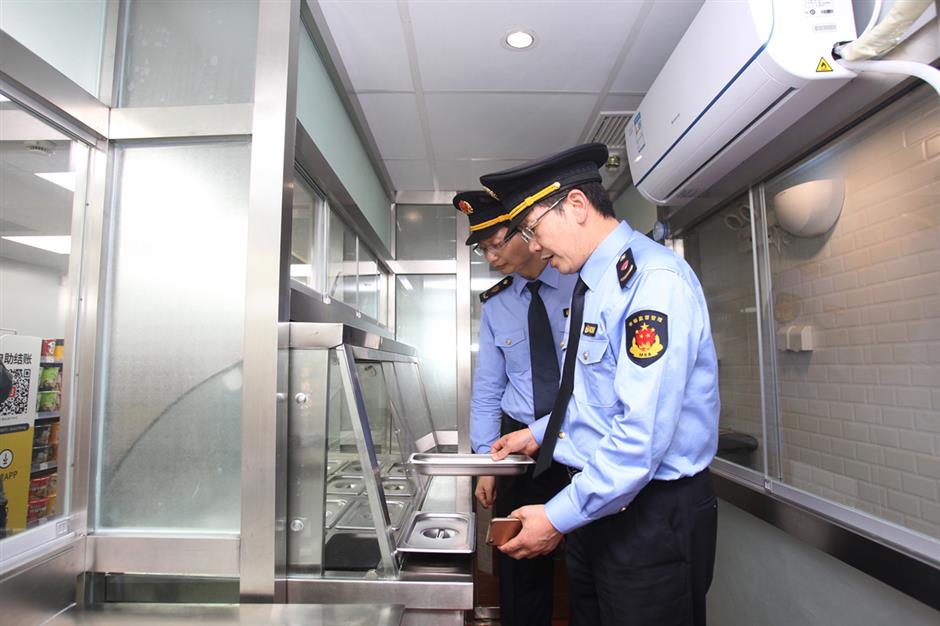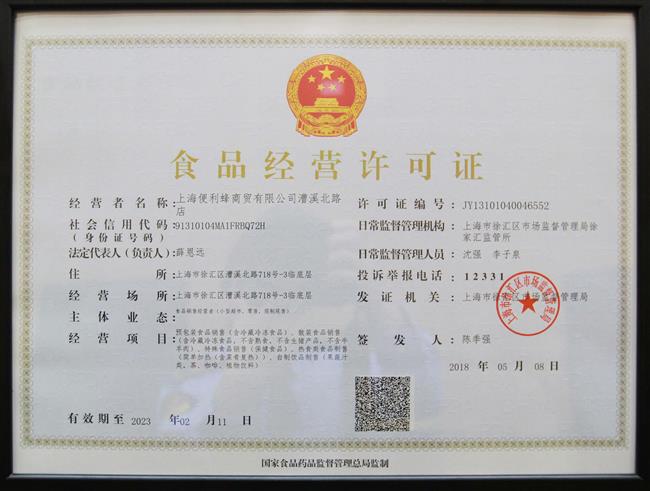Now you can dine in a convenience store

Two officials with the Xuhui District Market Supervision and Management Bureau check food containers at the Bian Li Feng convenience store in Xuhui.
A convenience store in Xuhui District yesterday received Shanghai’s first license allowing small supermarkets or convenience stores to process food supplied by central kitchens, enabling them to serve the dishes to customers.
Previously, regulations only allowed convenience stores to sell prepackaged food.
A guidance has been released by the Shanghai Food and Drug Administration on food safety and hygiene conditions of convenience stores with regard to the new licenses.
Bian Li Feng on Caoxi Road N., the convenience store that received its license for the new business from Xuhui’s market supervision administration, has set up a food processing area separated by glass.
The area has an oven and a sink, and will offer a choice from 18 dishes for lunch or dinner. Meat, vegetables and rice will be available and the price is about 15 yuan (US$2.35) per meal.
The convenience store’s new catering business starts operating from tomorrow.
Xin Yuanqing, director of the food circulation supervision department at Shanghai Food and Drug Administration, said the meals “are cooked at central kitchens and then transported to outlets of convenience stores. After simple heating and seasoning at the convenience stores, the meals will be served.”
The process combines food sales with catering services, he added.
So far, several other convenience stores and supermarkets — including the other two outlets of Bian Li Feng in Shanghai, Xing Bianli, another convenience store brand, and Lianhua Supermarket — have also applied for the licenses and are waiting for evaluation, according to food and drug officials.
The newly released guidance for convenience stores covers the venues, refrigerated facilities, heating, disinfection, raw materials, processing control and the handling of expired food.
The stores should separate or isolate the storage, heating, preparation, washing and disinfection areas of food and containers to avoid cross contamination.
There should be separate areas for the preparation of dishes, and air conditioning and disinfection facilities such as an ultraviolet lamp should be installed.
Heated food should be destroyed after four hours if not served and must not be refrigerated again, according to the guidance. Expired raw materials should be destroyed under surveillance cameras.
“Controlling the risk of cross contamination and tackling expired dishes are the priority in the guidance,” said Zhang Zhunmin, deputy director of the city’s food administration.
Market watchdogs are required to conduct random checks on convenience stores offering the new catering format.
Xuhui’s market watchdog granted the license to the Bian Li Feng outlet after an assessment of the guidance requirements.
“We actively support new emerging business types and always take food safety the priority the same time,” said Wu Jianguo, deputy director of Xuhui’s market supervision administration.
The new catering business has received positive feedback from nearby residents.
“The convenience store offers a new option for dining, and I will come and try its meals in lunch time,” said Liu Jianhua who works at a nearby office.
“I hope the food taste delicious and the menu can be changed daily,” he added.
Xue Aiping, a pensioner, said: “Convenience stores look cleaner than small eateries, and the price of the meals is affordable.”

Shanghai's first license allowing small supermarkets or convenience stores to process food supplied by central kitchens















